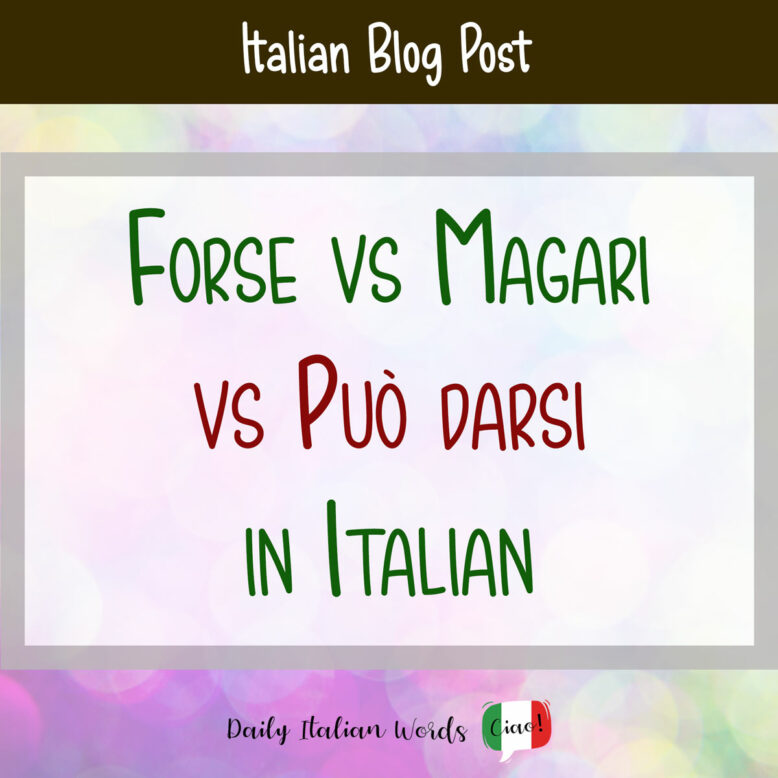When it comes to expressing doubt or uncertainty in Italian, forse, magari, and può darsi are the expressions you’ll hear all the time. They might seem like synonyms – and in some cases, they can be used interchangeably – but each one carries its own subtle nuances that make it unique.
Let’s break down their specific meanings so you can easily understand the main differences between forse, magari, and può darsi, and start using them to sprinkle uncertainty into your Italian conversations – after all, who doesn’t deal with a little doubt every now and then!

How to use ‘forse’ in Italian
Forse means maybe, perhaps, and is your trusty adverb when you’re feeling unsure or want to keep things noncommittal. You’ll hear it in all sorts of situations, but here are the key ways Italians use it:
In responses, forse expresses uncertainty about what’s just been said, similarly to maybe in English. In this case, it can also be swapped with può darsi (which also means maybe).
Non credi che sia meglio parlarne prima con lui? – Forse!
Don’t you think it’s better to talk about it with him first? – Maybe!
( = I’m not totally against it, I’m just not 100% sure it’s a good idea)
In affirmative sentences, forse keeps things uncertain, like a casual maybe or perhaps:
Forse domani vedo Giulia.
Maybe I’ll see Giulia tomorrow.
( = It might happen, it might not)
In this type of sentence, you could swap forse with magari for a similar vibe. The difference here is that magari implies a lower chance of something happening compared to forse.
Fun fact: Italians sometimes double up on forse (forse forse) when they want to say that while there’s still a bit of uncertainty, the chances of something happening are pretty good:
Forse forse riusciamo ad andare al mare questo weekend!
Maybe, just maybe, we’ll make it to the beach this weekend!
( = Fingers crossed, but let’s not pack the sunscreen just yet…)
When followed by a number, forse indicates that you’re not sure about the exact number, you’re just making an estimate:
C’erano forse venti persone alla festa.
There were maybe twenty people at the party.
( = It was around that number… but don’t quote me on that!)
Forse also helps you add a touch of sarcasm in questions where you already know the answer:
Credi forse che io sia contenta di questa situazione?
Do you maybe think I’m happy about this situation?
(= Clearly no, I’m not!)
Finally, forse also is used in the expression in forse, meaning something is still uncertain:
Volevo solo farti sapere che la riunione di domani è ancora in forse.
I just wanted to let you know that tomorrow’s meeting is still uncertain.
(= Keep your calendar open!)

How to use ‘magari’ in Italian
Magari is the adverb for when you’re wishing or hoping for something to happen. It comes from the ancient Greek word makarios, meaning happy, so it often brings a positive, hopeful vibe.
Here’s how to use it in different situations:
In Italian, magari is commonly used when dreaming about something you’d love to happen but know it’s a bit of a long shot. It’s like saying “if only” or “I wish” in English, and it’s usually followed by the imperfect subjunctive to perfectly express that feeling of longing:
Magari potessi venire in Sicilia con voi!
If only I could come to Sicily with you!
( = You’d love to, but sadly, it’s not happening this time!)
Magari can also be used when someone offers you something or invites you somewhere, and you’re thrilled to accept. It’s like the delightful I’d love to! in English:
Ti va un caffè? – Magari!
Would you like a coffee? – Yes, I’d love one!
( = You’re definitely interested in that coffee!)
When someone asks if you did or received something fabulous and you didn’t, that’s when you say magari with a little sigh, like a wistful I wish! in English:
Sei riuscita a comprare i biglietti per il concerto degli Oasis? – Magari!
Did you manage to buy tickets for the Oasis concert? – I wish!
(= No tickets for me, but oh, how I would’ve loved them!)
When you want to politely turn down an invite without sounding too harsh – because you’re potentially interested but not fully sold, or just not into it at all – using magari can help sweeten your response:
Che ne dici di iscriverci in palestra? – Magari… vediamo!
How about we sign up for the gym? – Perhaps… we’ll see!
( = You might be interested, just not ready to commit to those squats yet…)
Sometimes magari steps into forse territory, meaning maybe. Just keep in mind that, as a general rule, magari usually suggests there’s a lower chance of something actually happening compared to forse:
Magari stasera veniamo anche noi al cinema.
Maybe we’ll join you at the movies tonight.
( = It’s a low chance)
Forse stasera veniamo anche noi al cinema.
Maybe we’ll join you at the movies tonight.
( = There’s a solid chance this might happen)

How to use ‘può darsi’ in Italian
Può darsi is very similar to forse, expressing that sense of possibility or uncertainty, especially when you want to keep things open-ended. It combines può (which means it can) and darsi (the reflexive form of dare – to give). So, you can think of it as saying it can give itself.
You can use può darsi on its own when someone asks you a question and you’re not really sure about the answer. It’s like saying maybe or could be in English:
Vieni anche tu domani? – Può darsi.
Are you coming tomorrow? – Maybe.
( = Who knows, my plans are still up in the air!)
Può darsi is also commonly used in sentences followed by che (that) and a verb in the subjunctive form to express uncertainty about a situation:
Può darsi che mi sbagli, ma sembra che tra quei due sia successo qualcosa
I could be wrong, but it looks like something happened between those two.
(= You might not have all the clues, but something is definitely brewing!)
To emphasise that uncertainty even more, you could add anche (also) between può and darsi:
Può anche darsi che sia successo, ma sicuramente non è tutta colpa loro.
It may have happened, but it’s definitely not all their fault.
( = There’s always room for uncertainty, but let’s not blame it all on them!)

Valentina Nicastro is a travel writer in love with her home country, Italy. Having travelled widely around the globe, she realised there was more to explore closer to home and decided to put the passport aside for a while. When she is not immersed in documenting Italy, you’ll find her donning her communication consultant hat, weaving words as a content writer and bridging linguistic divides as a translator.


